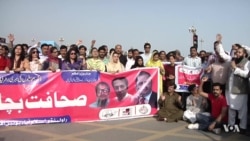Various journalist unions across Pakistan protested Tuesday the direct and indirect intimidation they say they face while trying to do their job.
“The journalist is alive, Ayub saw it, Yahya saw it, now you will see it,” chanted a charged group of protesters in capital Islamabad calling out names of past dictators.
Pakistan has long been a dangerous country for journalists who report on issues like extremism, militancy, religious fundamentalism, or military interference in politics. A country with a history of military coups has recently witnessed an unprecedented period of civilian rule. But journalists say 10 years of democracy has not strengthened freedom of the press.
Veteran journalists Nasir Zaidi was one of the few who was flogged during the dictatorship of General Ziaul Haq in the 1980s. He called the current situation worse and more confusing for the working journalists, leading to an increasing trend of self-censorship.
“Today, we have a façade of democracy, the constitution is intact, but behind the scenes dark forces are using all means necessary to control journalism,” he said.
The “dark forces” is a euphemism for the country’s powerful military establishment and its intelligence agencies. According to the New York based Committee to Protect Journalists, Pakistan’s military uses both direct and indirect intimidation.
For several years, Pakistan was on the list of countries the CPJ considered most deadly for journalists. Its recent report acknowledges that killings of journalists in Pakistan has gone down. But it says the decline in deaths was accompanied by a decline in press freedom.
WATCH: Pakistan press freedom
The report accuses the military of encouraging self-censorship.
“Journalists who push back or are overly critical of authorities are attacked, threatened, or arrested,” the report said.
Meanwhile, Pakistan’s new civilian government of Pakistan Tehreek e Insaf, elected in a July election, said it will ensure press freedom.
“We have a track record of freeing institutions of political interference in KPK,” said Faisal Javed Khan, a young senator of PTI, and additional secretary to the information minister. PTI is the ruling party in KPK province since 2013. He said, however, his government in the center was new and needed time to deliver on its promises.
On the other hand, PTI, which is considered close to the military, has already started facing criticism for its treatment of the media.
Journalist Umber Khairi wrote in her column in the Sunday edition of The News, an English language publication, that PTI had tried to block critical reporting by “threatening certain media groups with denial of access to official functions and personalities, uninviting their reporters and editors from meetings with the PM.”
A senior journalist and television anchor Nusrat Javed said media owners and editors in Pakistan are under pressure to either control or get rid of journalists deemed too critical of the establishment or the new government. The establishment in Pakistan is usually considered to be the powerful military and the intelligence agencies linked with it.
Earlier this week, prominent journalist Cyril Almeida was ordered to appear in court to face accusations of treason, a capital offense. He had published an on the record interview with former prime minister Nawaz Sharif in which Sharif talked about cross border terrorism, particularly an attack on Indian financial capital Mumbai in which more than 150 people, including Westerners, died. Sharif seemed to imply that Pakistan should do more to curb such attacks and the people responsible for it.
India and the United States have long held Pakistan based group Lashkar e Taiba responsible for the attack. After the attack, the group was placed on the U.S. and U.N. lists of terrorist groups.
Amina Malik, the woman who filed the petition to charge Almeida, along with Sharif and another former Pakistani premier, Shahid Khaqan Abbasi, with treason said the Sharif interview damaged Pakistan’s reputation in the world and Almeida should never have published his comments.
“Article 19 of the constitution gives you the right to freedom of expression. But it does not give you the right to speak against your own country or your own institutions,” she said.
The Human Rights Commission of Pakistan said the journalist was “hounded for nothing more than doing his job” and that the move would “further choke press freedom in Pakistan.”
At Tuesday’s protest in Islamabad, organized by Pakistan Federal Union of Journalists, another veteran journalist said the combination of the threats to media with apparent freedom led to a culture of self-censorship.
“You don’t know which lines you could cross and which you couldn’t. So, in the fear of crossing the wrong lines, you decide not to publish or air a story,” he said.









